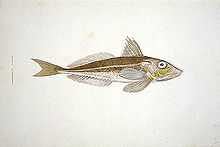Grey gurnard
| Grey gurnard | |
|---|---|
 | |
| Scientific classification | |
| Kingdom: | Animalia |
| Phylum: | Chordata |
| Class: | Actinopterygii |
| Order: | Scorpaeniformes |
| Family: | Triglidae |
| Genus: | Eutrigla Fraser-Brunner, 1938 |
| Species: | E. gurnardus |
| Binomial name | |
| Eutrigla gurnardus (Linnaeus, 1758) | |
Eutrigla gurnardus, the grey gurnard, is a species of searobin native to the eastern Atlantic Ocean, the Mediterranean Sea and the Black Sea. This fish can be found at depths of from 10 to 340 metres (33 to 1,115 ft) though it is not normally found below 150 metres (490 ft). This species grows to a length of 60 cm (24 in) TL though usually reaching up to 30 cm (12 in) TL.[1] This species is the only known member of its genus.[2]
In Ireland, the fish has been called the cuckoo fish, knoud or noud..[3]
Behaviour
As other sea robins, grey gurnards produce sounds. Sound production in this species is often associated with competition for food. Small individuals produce more sounds than larger ones, and emit more "grunts" than "knocks", probably because they more often compete for food by contest tactics whereas larger specimens predominantly scramble for food.[4]
Fisheries
Grey gurnard are of commercial importance as a food fish.[5]
See also
- List of fish of Great Britain
References
- ↑ Froese, Rainer and Pauly, Daniel, eds. (2012). "Eutrigla gurnardus" in FishBase. December 2012 version.
- ↑ "Eutrigla Fraser-Brunner, 1938". Integrated Taxonomic Information System.
- ↑ "The Ancient and Present State of the County of Cork". The ancient and present state of the county and city of Cork. Guy & Co. Ltd. Guy and Co. Ltd. 1893. Retrieved 30 Nov 2013.
- ↑ Amorim, M. C. P.; Hawkins, A. D. (2005). "Ontogeny of acoustic and feeding behaviour in the grey gurnard, Eutrigla gurnardus". Ethology 111 (3): 255–269. doi:10.1111/j.1439-0310.2004.01061.x.
- ↑ "Eutrigla gurnardus (Linnaeus, 1758)". FAO Species Fact Sheets. FAO Fisheries and Aquaculture Department. 2013. Retrieved 10 June 2013.
| Wikimedia Commons has media related to Grey gurnard. |